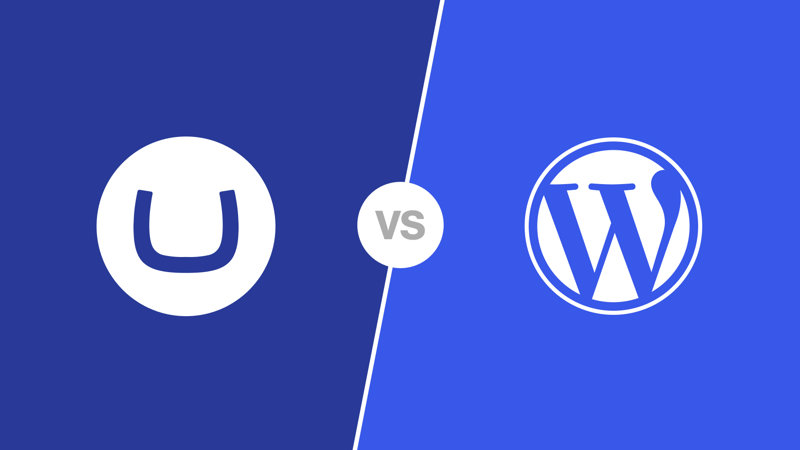Umbraco vs WordPress: which CMS is right for you?

Choosing the right content management system (CMS) can significantly influence your digital presence, and with countless options available two names frequently stand out: Umbraco and WordPress - both platforms have loyal followings and solid reputations, but they serve different needs.
This guide will help you understand the strengths and weaknesses of each.
What Is Umbraco?
Umbraco is an open-source CMS built on Microsoft .NET - known for its flexibility and scalability, it’s often the go-to choice for enterprise-level projects and custom websites and web applications, where full control over the codebase is essential.
Key features:
Open-source with commercial support options
Built on .NET Core
API-first architecture
Highly customisable
Designed for developers and enterprise-grade solutions.
What is WordPress?
WordPress is the world’s most popular CMS, powering over 40% of all websites on the internet. Initially launched in 2003 as a blogging platform, it has evolved into a full-featured CMS that supports a variety of websites, from simple blogs to complex eCommerce sites.
Key features:
Open-source and free
PHP-based with MySQL database
Huge ecosystem of themes and plugins
Strong community support
Ideal for non-technical users
Umbraco vs WordPress
Usability
Known for its user-friendly interface, Umbraco provides a structured and customisable content editing environment that’s especially well-suited to growing businesses and enterprise needs. Its modern back office has evolved significantly, offering a clean, intuitive interface that can be tailored to match the specific workflows of content teams.
While it may require more initial setup and developer involvement, Umbraco ultimately delivers a refined and scalable editing experience, giving organisations greater control and long-term flexibility without compromising on usability.
In comparison, WordPress offers a familiar dashboard and visual editor, making it easy to get a basic site up and running with minimal technical knowledge, however its out-of-the-box convenience often relies heavily on third-party plugins, which can limit scalability and lead to maintenance challenges over time.
Flexibility & customisation
Both platforms offer customisation, but in very different ways. Umbraco is built from the ground up for custom development. It doesn’t assume much about how your site should behave, giving developers full control over the code and architecture, and making it an excellent choice for complex or bespoke solutions which go beyond what plugins can offer.
In contrast, WordPress relies heavily on plugins and themes, making it easy to extend functionality or change the site’s look and feel, however, this approach can lead to conflicts, performance issues, or security vulnerabilities if not managed carefully.
Performance & scalability
Performance is another area where the two platforms diverge. Umbraco (built on the .NET platform) is inherently more performance-oriented, particularly when integrated into enterprise infrastructure; meaning it can handle large-scale applications, multisite management, and high-traffic environments with ease.
WordPress on the other hand can perform well with proper optimisation, caching, and quality hosting, however, its reliance on third-party plugins and themes can often lead to slower load times, whilst the enterprise-level scalability often requires significant effort and architecture planning.
SEO
Umbraco, a .NET CMS, offers more granular control over SEO features through its flexible and customisable architecture. This means that, rather than relying on plugins, developers can build SEO features directly into the site’s codebase, ensuring cleaner markup, faster load times, and more consistent performance. Additionally, Umbraco’s headless capabilities and support for structured data make it a strong choice for organisations with advanced SEO requirements or those integrating with external digital marketing platforms.
In comparison, WordPress has a reputation for being SEO-friendly out of the box, largely due to its vast plugin ecosystem. Popular tools like Yoast SEO and Rank Math make it easy for users to manage metadata, generate XML sitemaps, and implement best practices without touching code; making WordPress particularly accessible for marketers and content teams focused on on-page optimisation and rapid publishing.
Security
Security is a critical concern for any CMS. Umbraco benefits from the robust security model of Microsoft .NET, meaning it tends to be more secure out of the box, whilst its lower market share and controlled development model also reduce the likelihood of common attacks.
In contrast, WordPress, due to its large user base and plugin ecosystem, is a frequent target for hackers - with any security updates or measures largely falling to the site owner or developer.
Hosting
Built on ASP.NET Core, Umbraco is commonly hosted on Microsoft Azure, IIS, or Linux servers that support .NET. The hosting is more technical and usually requires developer involvement, but it offers robust enterprise level performance and scalability, with strong support for caching, CDNs, load balancing, and large-scale content handling. Its architecture is also efficient, making it ideal for high-performance and high traffic, structured websites, especially in Microsoft-based environments.
In contrast and running on PHP and MySQL, WordPress is easier to host and has far more options—ranging from basic shared hosting to premium managed services like WP Engine and Kinsta. However, performance can degrade as a result of increased plugins and/or high traffic.
Community & support
Whilst small, Umbraco’s community is highly engaged and professional, with the platform also offering commercial support through Umbraco HQ - giving businesses the peace of mind that comes with enterprise-grade assistance and service-level agreements.
WordPress on the other hand has a vast global community, with thousands of tutorials, forums, plugins, and developers readily available, however its open-source nature can lead to inconsistent quality and support.
Which one should you choose?
Conclusion
The right CMS ultimately depends on your specific project needs, technical resources, and long-term goals. Umbraco and WordPress are both powerful CMS platforms, but they cater to different audiences - WordPress is ideal if you're looking for a quick, user-friendly solution with a vast plugin ecosystem, whereas Umbraco is the better option if you need a scalable, secure, and fully customisable system built on .NET.
Interested in hearing more?
Need help deciding between Umbraco and WordPress for your business? Get in touch with the 16i team.
Share article:

Benefits of Umbraco 13
With frequent performance reviews, security patches and bug fixes, Umbraco is actively maintained and regularly updated, with the latest version (Umbraco 13), due for release in December 2023.
Read more